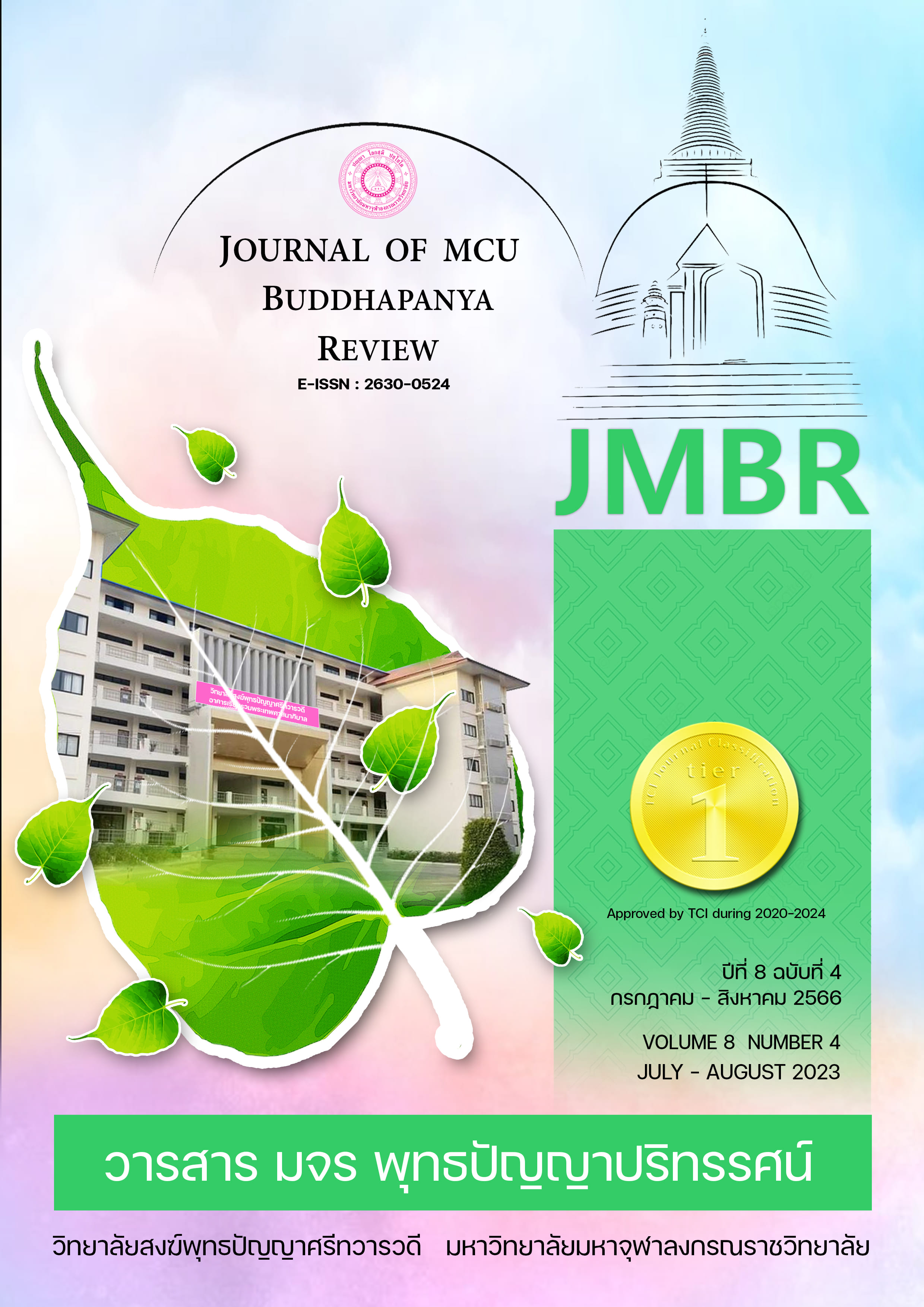รูปแบบการบริหารงานวิชาการเพื่อพัฒนาการจัดการเรียนรู้เชิงรุก ของครูโรงเรียนวัดรางกำหยาด สังกัดสำนักงานเขตพื้นที่การศึกษาประถมศึกษานครปฐม เขต 2
คำสำคัญ:
รูปแบบการบริหาร; , การบริหารงานวิชาการ; , การจัดการเรียนรู้เชิงรุกบทคัดย่อ
บทความวิจัยนี้มีวัตถุประสงค์เพื่อ 1) ศึกษาสภาพปัญหา และความต้องการพัฒนา 2) ศึกษาองค์ประกอบ และสร้างรูปแบบการบริหารงานวิชาการ 3) ศึกษาผลการใช้รูปแบบการบริหารงานวิชาการ และ4) ประเมินรูปแบบการบริหารงานวิชาการเพื่อพัฒนาการจัดการเรียนรู้เชิงรุกของครู โรงเรียนวัดรางกำหยาด ผลการวิจัยพบว่า ผู้บริหารและครูมีความคิดเห็นต่อสภาพปัจจุบันเกี่ยวกับการบริหารงานวิชาการเพื่อพัฒนาการจัดการเรียนรู้เชิงรุกของครู ในภาพรวมอยู่ในระดับปานกลาง รูปแบบการบริหารงานวิชาการเพื่อพัฒนาการจัดการเรียนรู้เชิงรุกของครู โรงเรียนวัดรางกำหยาด มี 6 องค์ประกอบ ได้แก่ (1) หลักการ (2) วัตถุประสงค์ (3) องค์ประกอบของชุมชนแห่งการเรียนรู้ทางวิชาชีพครู ได้แก่ 1) ผู้นำการบริหารและวิชาการ 2) ทำงานเป็นทีม 3) การพัฒนาหลักสูตรสถานศึกษา 4) กระบวนการจัดการเรียนรู้เชิงรุก 5) ระบบดิจิทัลเพื่อการบริหารงานวิชาการ และ 6) การวิจัยและพัฒนา (4) กระบวนการเรียนรู้ 5 ขั้นตอน ได้แก่ ขั้นวิเคราะห์ (Analyze) ขั้นวางแผนการจัดการเรียนรู้ (Plan) ขั้นเปิดชั้นเรียนและการสังเกตขั้นเรียน (Teaching and Observation) ขั้นสะท้อนคิดเพื่อการพัฒนา (Reflect) และขั้นสรุป แก้ไขปรับปรุง และพัฒนาต่อเนื่อง (Revise) (5) การวัดและประเมินผล และ (6) เงื่อนไขความสำเร็จ มีผลการใช้รูปแบบการบริหารงานวิชาการเพื่อพัฒนาการจัดการเรียนรู้เชิงรุกของครู โรงเรียนวัดรางกำหยาด พบว่า (1) คุณภาพของแผนการจัดการเรียนรู้เชิงรุกของครูโรงเรียนวัดรางกำหยาด มีผลการประเมินโดยรวมอยู่ในระดับมากที่สุด (2) การพัฒนาการจัดการเรียนรู้เชิงรุกของครูมีผลการประเมินโดยรวมอยู่ในระดับมากที่สุด และ (3) ผลงาน/ขึ้นงานของนักเรียนโรงเรียนวัดรางกำหยาด มีผลการประเมินโดยรวมอยู่ในระดับมากที่สุด และผลการประเมินรูปแบบการบริหารงานวิชาการเพื่อพัฒนาการจัดการเรียนรู้เชิงรุกของครู โรงเรียนวัดรางกำหยาด ด้านความต้องครอบคลุม ด้านความเป็นประโยชน์ ด้านความเหมาะสม และด้านความเป็นไปได้ มีผลประเมินโดยรวมอยู่ในระดับมากที่สุด
เอกสารอ้างอิง
Chanprasert, C. and others. (2021). A model of excellence in academic administration. of school administrators under the Secondary Educational Service Area Office. Academic research journal. 4(4), 143–156.
Charoennit, S. (2021). Using digital technology in academic administration of educational institutions. Bua Bandit Educational Administration Journal. 21(1), 61-74.
Chitchayavanich, K. (2019). Learning Management, Bangkok: Chulalongkorn University Press.
Dan, C. (2012). Professional Learning Communities' Impact on Science Teacher Classroom Practice in a Midwestern Urban School District. Dissertations. Lincoln, USA.: University of Nebraka-Lincohn.
Detsri, P. (2002). Active Learning: How can it be done? IPST Journal 30(116) : 53-55.
Hahaohan, S, Chittanan, T. Saraban, W. (2016). Administrative model for educational institution excellence. Under the jurisdiction of the Secondary Educational Service Area Office. Journal of Education Mahasarakham University 10(3), 202-220.
Hallam, P.R., et al. (2015). Trust and Collaboration in PLC Teams: Teacher Relationships,Principal Support, and Collaborative Benefits. NASSP Bulletin. 99(3) (Sep.); 193-216.
Jitranan T.(2020). A study of the professional co-educational supervision model to study academic work. Measuring and evaluating learning outcomes in basic educational institutions Northeast. Journal of Peace Studies Review MCU. 8(6), 2229-2241.
Kitrungruang, P. and Orapin Sirisamphan. (2018) Teacher Professional Learning Community : Strategies for Improving Educational Quality : Concepts to Practice, Nonthaburi : M & N Design.
Laureendee, W. t Kitrungruang, P. and Orapin Sirisamphan. (2017). Proactive Learning Management Strategies to Develop Thinking and Raise Educational Quality. For the 21st century. Nakhon Pathom Petchkasem Printing Group
Marlowe, B. A., & Page, M. L. (2005). Creating and Sustaining the Constructivist Classroom. (2nd ed.). California: Corwin Press.
Puangsomchit, C. (2017). Professional learning community. and guidelines for use in educational institutions. Journal of Education, Thammasat University 10 (1): 34-41.
Suwannamkha, S. (2018). Professional learning community for educational development in Compilation of course contents Innovation in educational administration and leadership, Units 1-7. Nonthaburi: Sukhothai Thammathirat Open University Press.
Suwanwela, C, Thai Higher Education (Bangkok: Chulalongkorn University Press, 2002), 2. Pimpan Dechakupt and Payao Yindeesuk. (2014). Learning management in the 21st century. Bangkok, Chulalongkorn University Press. .
Thanawutthipornpinit, Si. (2010). The development of analytical thinking skills. science learning group Grade 6. Rajamangala University of Technology Thanyaburi. Faculty of Industrial Education. Department of Technology Research and Development Curriculum.
Thippho, S, Narong Pimsarn, and Sirikan Thanawutpornpinit. (2020). Model of academic administration leading to school excellence. Under the jurisdiction of the Secondary Education Service Area Office 1. Ph.D. thesis (Educational Administration). Bangkok: Graduate School North Bangkok University Photocopy.
Udomsri, T. (2015). School administration model for building a professional learning community in classroom action research. Thesis, Ph.D., Chulalongkorn University, Bangkok .
Unkham, W. (2015). The Development of Academic Administrative Models of Educational Institutions under the Area Office. Secondary Education Area 21. Thesis. M.Ed. (Educational Administration), Mahasarakham: Graduate School Mahasarakham University Photocopy.
Wisalaporn, S. managing like Ramakien Manage like me, 3rd edition (Burapha University, Chonburi : MN Computer Offset Co., Ltd., 2011),7.
Wongnutaroj, P, Academic Administration (Bangkok: Bangkok Publishing Center, 1992), 16.
ดาวน์โหลด
เผยแพร่แล้ว
รูปแบบการอ้างอิง
ฉบับ
ประเภทบทความ
สัญญาอนุญาต
ลิขสิทธิ์ (c) 2023 วารสาร มจร พุทธปัญญาปริทรรศน์

อนุญาตภายใต้เงื่อนไข Creative Commons Attribution-NonCommercial-NoDerivatives 4.0 International License.



